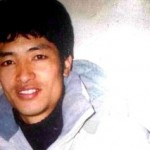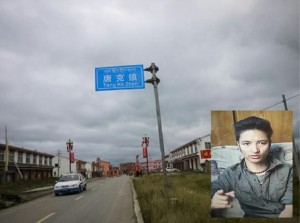 Jigje (also Jigme) Kyab, a resident of Thangkor town in Dzoege county in the Ngaba (Aba) Tibetan Autonomous Prefecture, had vanished on April 13 following a visit to his house by an official of Thangkor town and local government employees who were investigating his protests about the seizure of community land by authorities five years ago. He is sought by the police and was thought to be detained. But as is seen in a recently released video, Kyab is actually safe and in hiding.
Jigje (also Jigme) Kyab, a resident of Thangkor town in Dzoege county in the Ngaba (Aba) Tibetan Autonomous Prefecture, had vanished on April 13 following a visit to his house by an official of Thangkor town and local government employees who were investigating his protests about the seizure of community land by authorities five years ago. He is sought by the police and was thought to be detained. But as is seen in a recently released video, Kyab is actually safe and in hiding.
“I evaded capture and am hiding in a safe place. I would like to apologise to all those who were worried about my security,” said the 39-year-old in the video, a copy of which was obtained this week by United States government-funded Radio Free Asia (RFA)’s Tibetan Service. “The main reason I went into hiding is so we can present our case to higher provincial authorities. This is the only way we can seek support for the truth,” he added.
An RFA source said, on condition of anonymity, “when neighbours came to check on him in the afternoon, he was found to be missing from the area.” The source continued, “He was taken away without any notice given to his relatives. Tibetans living in Thangkor town’s Karuma village believe that local authorities took this action to retaliate for their taking the land-grab issue to higher authorities at the provincial level. This was a misuse of their authority”. Kyab’s worried family members later approached a Dzoege county official named Tashi for information but he denied that Kyab had been detained.

Tibetans from Thankhor village protest outside the Sichuan Provincial People’s Congress meeting earlier this year.
Photo: Phayul
The source also believes that the incident was linked to Kyab helping lead a protest by 20 Tibetans from the Thangkor area in the Sichuan provincial capital Chengdu on January 28. “All the protesters were taken back to Thangkor town but Jigje and a colleague named Tsepak were detained for a long time before being released,” noted the source.
The requisitioning of rural land for lucrative property deals by local governments triggers thousands of similar “mass incidents” across China every year. Many result in violent suppression, the detention of the main organisers and intense pressure on the local population to comply with the government’s wishes.





 Print
Print Email
Email